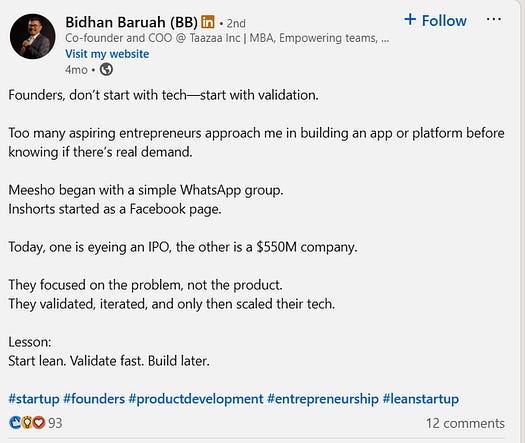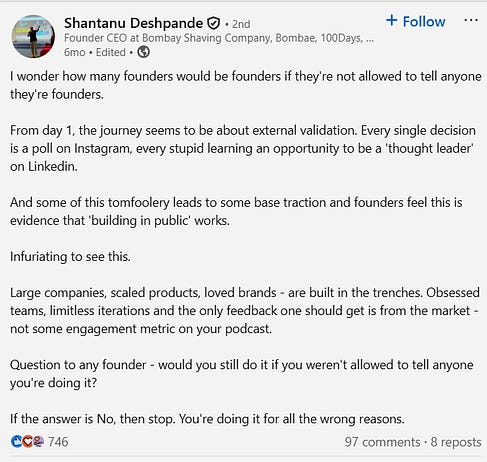Validation Is an Emotional Game. Period.And If You’re a Founder in Validation, This Is the Only Lens That Keeps You Sane.If you are a founder validating a new idea right now — whether in AI, deeptech, biotech, hardware, retail, marketplaces, B2C, B2B, or B2G — this essay is designed for you and you alone. Not for investors. This is a field guide for the ones in the fog — building something that might exist, sensing markets that might care, and wrestling with a million unknowns every single week. Let’s strip it down to the truth most founders intellectually understand but emotionally resist:
And because of that, validation is an emotional game — not a systems game, not an operational play, not a strategic scaling exercise. Here’s the part no one tells you:
Let’s walk through this with the clarity you deserve. Validation Is Not Company-Building.It’s Conviction-Building.** When you’re validating, you’re not on a quest to build a polished structure. Everything else is secondary. I don’t care if you’re sequencing RNA for a synthetic biology application, designing a new AI agent framework, building a hardware sensor for municipal wastewater detection, creating a D2C wellness product, or launching a local services marketplace. The same reality applies: Until you know the truth about the customer, the pain, the urgency, and the willingness to pay… Not your logo. Founders in validation fall into two categories: (1) Those who think they’re building a company and fail. If you’re in category 2, this article is for you. The Actual Job Description of a Validating FounderIf we remove the startup jargon, your job right now is:
You are not supposed to know what you’re doing yet. You are supposed to become aware of what’s true — and what’s false. This is the work. And emotional intelligence is not “soft stuff” here — it is the primary tool of discovery. Why Validation Feels Chaotic — And Why That’s CorrectValidation feels like:
This is not dysfunction. The chaos is not a bug — it’s the data. If you aren’t confused, you’re not exploring wide enough. In validation, “feeling lost” means you’re doing the work. Improvisation Is the Operating System of ValidationTwo major research works confirm this: 1. “Improvising Entrepreneurship” (TIM Review, 2014)The paper shows that early-stage entrepreneurs rely primarily on real-time improvisation because the unknowns are too large for structured planning. 2. “Toward a System Model of Improvisation” (2022)This study describes founders in uncertain environments as operating in “Real-Time Doing” mode — acting, reacting, adjusting in the moment. In other words:
You cannot run Six Sigma on fog. Validation demands improvisation because only improvisation can “feel around” reality fast enough. Story #1 — Airbnb: Validation Through Emotional SensitivityPeople mythologize Airbnb as a clever growth story. Brian Chesky and Joe Gebbia were:
The famous moment — when they personally took better photos of early listings — wasn’t strategy. It was emotional sensitivity:
Had they asked, “Is this scalable?” the company would’ve died. Instead, they asked, “What emotion changed when we did this?” That’s validation. Systems came years later. Validation Across All Domains:The Emotions Are the Same. The Objects Are Different.** A deeptech founder validating computational chemistry tooling faces the same emotional dynamics as a D2C skincare founder validating a serum:
A hardware founder pitching to municipalities experiences the same emotional oscillation as a marketplace founder pitching salon owners. A biotech founder talking to clinicians experiences the same uncertainty as an AI founder talking to enterprise CIOs. Why? Because the foundation of validation is human behavior — not category mechanics. The content changes. Story #2 — Superhuman: Validation Before SystemsBefore Superhuman became the “fastest email experience,” Rahul Vohra spent months inside what he calls “qualitative hell.” He did:
When they sensed repeatable desire, THEN they built the PMF Engine — a quantifiable system. This is the sequence validating founders must internalize:
Most Validating Founders Fail Because They Adopt Post-PMF Behavior Too EarlyIf you try to copy:
…while still validating your idea, you will inject complexity before clarity. Premature operationalization is the #1 silent killer of early-stage startups. Before we go deeper, here’s a simple but powerful reminder from the trenches. This is the essence of validation: The moment you start optimizing before you understand the problem, you lock yourself into the wrong direction. Why? Because systems amplify whatever you feed them. If you feed a system:
…it doesn’t take you further. Validation is the act of preventing that tragedy. Story #3 — Ironclad: Emotional Pattern Recognition in an Industry That’s “Unemotional”Ironclad — a legal workflow automation company — sounds like a rational, enterprise SaaS story. But Jason Boehmig validated in a purely emotional way:
Lawyers. But Boehmig still found signal in micro-expressions, pauses, frustration, relief. This is the secret: The Danger Signals: When a Validating Founder Is Playing the Wrong GameIf you’re validating but you find yourself:
…you are playing the wrong game. Many founders desperately want validation to feel like growth. They want:
But if these things appear too early, it usually means something dangerous: You’re no longer discovering. Validating founders don’t need confidence. Confidence comes later — when reality replaces guesswork. What Actually Matters in Validation (The Only Four Things)Strip everything else away. 1. Know the exact customerNot a persona. 2. Know the exact painNot a problem statement. 3. Know the urgencyNot “this is interesting.” 4. Know the willingness to payNot compliments. Everything else — everything — is noise. If you don’t know these four with confidence, you are still validating, no matter how much revenue or hype you have. When to Stop Playing the Emotional Game and Start Thinking SystemicallyYou should only begin behaving like a “company” when:
This does not mean you are ready to scale. But only after validation has done its job. You Are Not Supposed to Feel Like a CEO YetYou’re not a CEO. And to make this even sharper, here’s a post that captures a quiet truth founders rarely admit — especially during validation, when self-identity becomes tangled with external perception: This hits hard because it’s true: When you remove the performance layer, what remains is the real job: You don’t need:
You need:
You are building a map of a territory that does not exist yet. Final Thought:Validation Is Not the Beginning of Company-Building. You are not failing. You are discovering whether this idea deserves the next decade of your life. That’s not a process. The founders who win aren’t the ones with the smartest idea or the cleanest playbook. They’re the ones who understand the game they’re in — |
Wednesday, November 26, 2025
Validation Is an Emotional Game. Period.
Subscribe to:
Post Comments (Atom)
Early Growth Is Not Scaling. It Is the Search for Repeatability.
Most startups don’t fail at validation or scale. They stall in between. This essay explains why early growth is about discovering repeatable...
-
Crypto Breaking News posted: "Mikhail Fedorov, Ukraine's Deputy Prime Minister and the head of the country's Minist...
-
kyungho0128 posted: "China's crackdown on Bitcoin (BTC) mining due to energy consumption concerns is widely regarded as...
-
lovesarahjacobs posted: "Download our free Coinbase pro app and receive signals on your mobile – https://play.google.com/st...



No comments:
Post a Comment